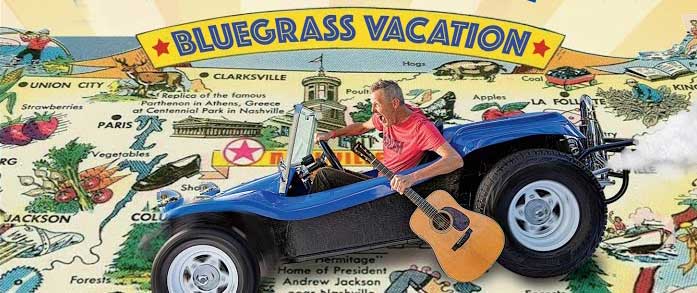
Robbie Fulks has a reverence for his roots, and while most artists that operate within the realms of Americana can claim the same, Fulks found the means of tying his passion and his purpose. His new album, Bluegrass Vacation, finds him coming full circle. So even though it’s been 27 years since he made his initial entry, the current album could be considered his most essential effort to date.
Working with a cast and crew that includes Sam Bush, John Cowan, Chris Eldridge, Ronnie McCoury, Jerry Douglas, Brennen Leigh, and Shad Cobb, he’s fashioned a set of songs that celebrate his connection to a sound that inspired him early on.
He describes the beginnings of his journey in the liner notes, making mention of the early shows he saw by Doc & Merle Watson, John Hartford, and the Earl Scruggs Revue, and how those experiences informed the musical persona he would adopt later on. He also talks about the first band he worked with, which happened to be Greg Cahill’s Special Consensus, an outfit that helped propel a musical journey that’s extended over the course of 30 years and 15 albums, while instilling his reputation as one of the most remarkable singer/songwriters in his field.
Fulks recently made an appearance on the Outlaw Country Cruise, and although he was a last minute booking, the audience engagement imbued within his delivery effectively defined every performance.
“I’ve been trying to get better at it,” he confessed when Bluegrass Today caught up with him by phone. “I’ve had a while to work on my chops. And until I start sort of physically falling apart, I think I’m at a peak.”
He’s also been adept at expanding his parameters. “I appreciate that,” he replied. “That’s pretty much what I’m trying to do.”
Of course, it’s more than that hint of humor which has marked Fulks’ efforts thus far. It’s a slightly sardonic approach filled with irony, satire, and a way of looking at things that at times can be quite unexpected.
“It’s part of me, so I don’t know if I could have kept that out of the music,” he reflects. “There are definitely other people in music that use irony and snarkiness and humor in various ways. Roger Miller comes to mind. So yeah, I love those people, and yeah, I think that’s definitely always been in there. I would say I’ve used less of it in the last ten or so years than during the previous 15 years, especially as I’ve gotten older, and probably a little less lighthearted as a person. But, still, I hope that never goes away completely.”
Given his reputation, it’s doubtful it ever will.
“There’s also just the fact that performing live is something that I do, more than 100 times a year, and making a record is something I do, for two weeks, every other year,” he mused. “So it’s really been something for me to learn, like how to how to project your personality on record, and, so when I get up on stage, it’s a diversion from sitting alone in a room. So when I get to get up on stage with a guitar, it’s just like pure fun, really. It’s just great. It’s great fun. And that’s what I want. There’s no reason why it shouldn’t show.”
Prior to Bluegrass Vacation, Fulks released two different sets of songs, each boasting more than 50 tunes and released as a thumb drive. Slowly however, the new album began to take shape.
“Those two projects came out within a year of the pandemic, and then from 2020 till 2022, my output was just in dribs and drabs,” he said. “This bluegrass thing was in the pipeline for a while. I planned to record it all the way through in April of 2020. And then, when COVID came, it just got kind of kicked down the road. I’d travel to Nashville every once in a while and do a couple of songs rather than doing it all in one chunk. It kind of got bottlenecked for a long time. So all that stuff kind of held up that particular project, and I think that accounts for most of the delay, and most of the time between projects.”
His current record label, Compass Records, expressed its interest after Fulks finished tracking the album. It was originally slated to come out on Rounder Records, but when his liaison at the label left, Compass offered its support and desire to share the album with the world.
That said, the idea for a bluegrass album began to take hold at least a decade ago. “Looking back toward earlier iterations of myself, I started leaning to bluegrass more explicitly around 2011 when I was working on my record called Gone Away, Backward,” he explained. “I started playing acoustic music into microphones, and thinking about older themes, and older people, and the original music that started filtering into my brain when I was a little kid. And so it kind of began back then. But at the same time, the songs on this record are pretty much representative of a guy in his late 50s. I’m thinking about myself there. And so in that sense, it’s not like, it’s not dipping back into the make believe land of Bill Monroe in 1960, or something like that. It’s where I am right now.”
So too, the new album is comprised of mostly all original material.
“There’s one on there, called Nashville Blues, that was a Delmore Brothers song that Tim O’Brien and I sang in our own way,” he notes. “But the rest of them are tunes I made up.”
Given the kudos and acclaim Fulks has drawn over the years, one might wonder if those earlier accolades force him to look over his shoulder and think about any sort of high bar that may accompany his audience’s expectations. Fulks quickly sets that idea aside.
“I would say I don’t give that a second thought,” he insists. “The sort of genesis of my experience being alone and working on songs in a house or a hotel room somewhere makes that the last thing that’s on your mind when you’re trying to make something happen. It’s pretty humbling to try to make something happen, and I often I have this this conscious thought when I’m working on something, which is do I really know what I’m doing here? And have I ever actually done this before? And if so, how did I do it? It’s pretty humbling. Each time is like the first time.
I know, it’s crazy. And I’m sure that I have little techniques to speed things up. For instance, I’m able to recognize quickly if a song is not really taking me by storm, or if it doesn’t seem very promising. And so I’m a little quicker to throw out stuff, and so songs are more liable to hit the trash can sooner. But I also have kind of a superstitious idea that if I do think of myself as experienced, and knowing what I’m doing, then the songs won’t come out as well.”
That’s not to say Fulks lacks confidence. It’s clear that’s hardly ever the case.
“It’s really more self editing, which has always been part of the process,” he suggests. “It’s like when you’re working on a song, at least four times out of five, maybe nine times out of ten, it’s not a good song, and you end up throwing it away, or you end up recording it and kind of regretting it shortly after, while thinking how that wasn’t as good as I thought. So the self-editing component of all this is really vital. It’s an important part of seeming like you know what you’re doing.”







